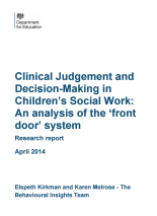The specific question that was set for the project team was: What behavioural factors affect social workers’ decisions at the ‘front door’ and how can we improve the ‘front door’ process to help social workers make better decisions? To answer this question, BIT undertook research in three different domains:
- Site visits to five different Local Authorities. BIT uses a form of participant observation to understand better the conditions faced by the users or deliverers of services, so this was a key part of the analysis.
- A review of the relevant behavioural science literature. In particular, we examined the latest research on expert and professional decision-making.
- A more domain-specific literature review. This literature was focused specifically on research relating to social workers and child protection more generally.
The analysis suggested that there were four key behavioural factors that complicate or reduce the efficiency of social workers’ ability to make often highly complex, challenging decisions. These are that:
- Time and workload pressures increase the reliance upon social workers’ intuition to make decisions. Other similar professions have focused more overtly on the development of evidence-based, skilled intuition.
- A range of behavioural biases affect social workers’ ability to make objective judgements. These include, for example, the availability heuristic (people make judgments about the probability of events based on how easy it is to think of examples), confirmation bias (only looking for evidence that confirms pre-existing views) and the tendency to judge cases on their relative rather than objective merits.
- The complexity of social workers’ decision-making is increased further by the fact that many sequential decisions have to be made through the course of a single day, which engenders depletion or ‘decision fatigue’.
- The information provided to social workers is often of relatively low quality. This means that significant energy is expended piecing together a full picture of the relevant information, leaving less time for analysis of each case.
